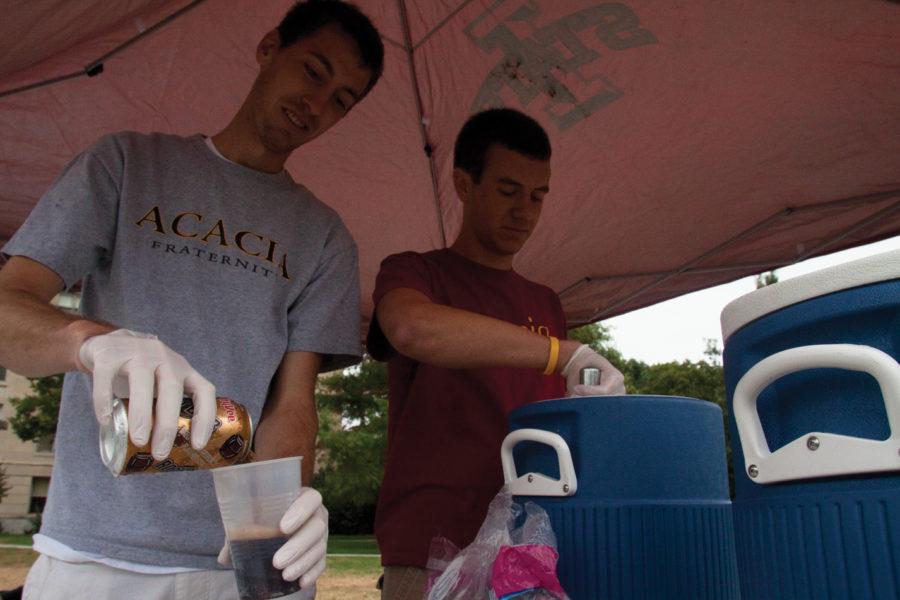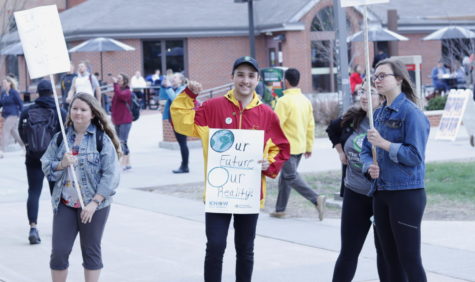Facebook changed how greek chapters promote philanthropies
File Photo: Kelsey Kremer/Iowa State Daily
Michael Felderman, senior in physics, and Sam Behrens, sophomore in history, make root beer floats Thursday, Sept. 16, on Central Campus as a part of their fraternity’s annual philanthropy. Acacia sold root beer floats for $2 to raise money for Pages of Promise.
September 23, 2010
Online social networks, such as Facebook and Twitter, are not only used as a way to stay connected to friends and share pictures, they are being used as advertising tools to promote local events, such as philanthropies in the greek community.
Katie Mott, assistant director of Greek Affairs and a former member of the ISU greek community from 2001 to 2004, said that while she was a student, philanthropies were advertised from members going to other chapter houses informing them of the event, as well as using fliers and word of mouth.
Today, while these dinner announcements are still used, Facebook is now the main source of information, taking the place of other marketing strategies used in the past.
“I think it’s … more organized,” Mott said. “It gives the chapter more of an idea of how many people to expect, and they can reach a lot more people.”
Many fraternities and sororities create events on Facebook, with details such as the time, location, cost, description of the activities or food that will be provided, and the cause the proceeds will benefit. Chapters can then open it to the public online and invite their friends to see the page and RSVP to the event.
Acacia Root Beer Floats, which raises money for Pages of Promise to send textbooks to libraries and universities in Africa, had a Facebook event promoting the philanthropy two weeks in advance.
Derek Robison, sophomore in elementary education and philanthropy chairman for Acacia fraternity, created the page and invited all of his ISU contacts to it, telling the other chapter members to invite their friends as well.
Robison also uploaded a picture advertising the event and set it as his profile picture. Many of the members of the fraternity wrote statuses on their Facebook profiles informing people of the time and location and encouraging everyone to attend. Robison said 800 people had responded “yes” or “maybe” to the RSVP in less than four days.
“It really got the word out,” Robison said. “Facebook raised awareness of what we were doing.”
Delta Delta Delta sorority’s annual philanthropy, Delta Wild Wings, has invited more than 2,600 students to their event on Facebook. The philanthropy raises money for St. Jude Children’s Research Hosptial and will take place Friday.
Alex Bowles, junior in communication studies and the philanthropy chairwoman for Delta Delta Delta sorority, said that Facebook events were not as popular in the past because it was not as easy to create them.
“We want as many people as possible,” Bowles said. She added that the Facebook page is also a way to inform people of the cause for the proceeds, not just the event. Delta Delta Delta sends out inbox messages to the people invited reminding them of the details as well.
Using Facebook is also a way to reach students who are not part of the greek community and invite them to be a part of the events. Mott said social networks are helping the chapters become more interactive and incorporating non-greek students.
Jill Kassel, senior in English and vice president of special events for the Collegiate Panhellenic Council, oversees the sororities’ philanthropies and community service on campus. She said Facebook is their biggest marketing tool.
“I know I haven’t dealt with a sorority who didn’t use Facebook,” Kassel said. “It definitely helps with the amount of money raised.”
Mott said with Facebook being an easier and more effective communication method, fraternities and sororities are becoming more innovative and creative.
“The biggest thing is that chapters think outside the box,” Mott said.
In the past, the fraternities and sororities did the same philanthropy every year. Mott said that now, people are coming up with great ideas and making changes, such as holding philanthropies on campus rather than in the chapter homes, or having the events at different times or on different days than they have been in the past.
Kassel said that she can see the chapters using online social networks more and more in the future.
“It’s growing and expanding,” Kassel said.

















